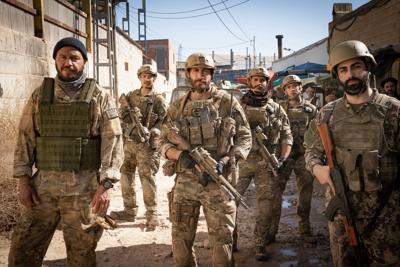Nearly two years after the American military withdrew from Afghanistan, ending the longest war in U.S. history, it should come as no surprise that filmmakers are starting to look back and ask, “What just happened?”
That’s what artists do, after all. They examine the world around them.
That Guy Ritchie is one of them in this case, however — that might be a surprise.
Heretofore, Ritchie has for the most part been one of the fun ones, building his name on stylish action, well-timed one-liners and heavier-than-a-lead-zeppelin British accents.
Substance? Nah, guv. No need.
But in his latest, the war drama “The Covenant,” starring Jake Gyllenhaal and set during the war in Afghanistan, he’s got something to say. This is serious Guy Ritchie. This is thoughtful Guy Ritchie. This is earnest Guy Ritchie.
If only profound Guy Ritchie had come along for the trip, we might be onto something special. Instead, we get a capably made but simple-minded rescue film, one with a big heart — even if it could have used more brain.
Real men follow through
Like his movie, Ritchie’s message is straightforward though honorable: Real men live up to their commitments. By extension, his film argues, countries should do the same.
At the heart of things, in this case, are the promises made to the small army of interpreters in Afghanistan who aided the U.S. military during its two decades there. In exchange for their service, many were promised travel visas for their families — and then unceremoniously left behind when the war so abruptly ended.
For storytelling purposes, “The Covenant” — on which Ritchie shares writing credit with Ivan Atkinson and Marn Davies — focuses on U.S. Army Sgt. John Kinley, played by Gyllenhaal. He leads a squad of soldiers tasked with finding and destroying Taliban bomb factories.
It’s dangerous work, as we learn early on in a scene that leaves Kinley’s small squad in need of a new interpreter.
Enter Ahmed (Dar Salim), who is far more than your garden-variety interpreter. He has skills, this Ahmed. He also has a very personal motivation for helping the Americans.
Fictional, yet compelling
It’s an undeniably compelling story, although it should be noted it’s also a fictional one. Ritchie’s film pretends very, very hard to be based on actual events. It is not, although it was inspired by the plight of many Afghan interpreters left behind in the U.S. withdrawal.
Those stories are well worth sharing. “The Covenant” can be criticized for a number of things, but there’s no questioning its noble heart.
Like Gyllenhaal’s Sgt. Kinley, Salim’s Ahmed is the strong, silent type, the kind of guy who exudes confidence and capability. They drink their coffee black, these guys. They grunt. They are warriors.
These are the kind of men whose highest compliment to one another is a solemn exchange of knowing nods, in silent recognition of each other’s towering manliness.
But before they get there, they first must learn to trust one another, which is the central purpose of the first hour of “The Covenant.” Without giving anything away, they eventually do, and Kinsley finds himself in Ahmed’s debt — a debt he spends the rest of the movie trying to repay.
An overreach?
That first hour also happens to be the part of the film that works the best. Handsomely shot, it moves along briskly, with crisp, exhilarating bursts of well-choreographed battlefield action. Ritchie even wisely dials back his trademark stylishness in deference to his story.
Then, at almost exactly the one-hour mark, he overreaches. His film, which showed such promise, begins buckling under the weight of its own self-importance.
Ritchie deploys multiple overlong montages. Dialog is dispensed with in favor of soliloquies. Weeping, mournful strings lament it all.
Cheapened by an overwhelming sense of muscle-headed masculinity, “The Covenant” transforms from a reasonably well-made war film into an overwrought bromance.
Tempting though it might be, it’s not fair to say Ritchie’s film gets lost in translation. But by the same token, when it’s all over, it doesn’t quite feel as if it has entirely lived up to its covenant with audiences.
Mike Scott can be reached at moviegoermike@gmail.com.
The carpet outside the theater on Thursday night was red, of course.
I’ve got a theory, and it might sound crazy at first, but stick with me here: Nicolas Cage is a genius.
A lot has been made in the past couple of years about the “death” of American cinema — which has, of course, been greatly exaggerated, as such…
Ever since the old Jazzland/Six Flags New Orleans amusement park closed ahead of 2005’s Hurricane Katrina, the city has tried again and again …





